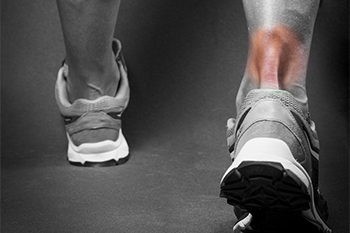
An Achilles tendon tear occurs when the tendon attaching the calf muscle to the heel completely tears. This injury is common and is often seen in middle-aged male sports enthusiasts. The Achilles tendon is the largest tendon in the body and can be prone to injury when sudden, explosive movement involved in running and jumping sports occurs during sports or exercise. Interestingly, taking certain antibiotics or cortisone shots can increase the likelihood of one tearing their Achilles. When this happens, one will feel a sudden pain behind the ankle. A pop or snap may be heard and one can feel like they have been kicked in the heel suddenly. It will make pointing toes down difficult and there may be swelling and bruising around the tendon. If you feel you might have torn your Achilles tendon or want more information to prevent this painful injury, consult with a podiatrist.
Achilles tendon injuries need immediate attention to avoid future complications. If you have any concerns, contact Glenn Aufseeser, DPM of Lakewood Foot and Ankle Specialists. Our doctor can provide the care you need to keep you pain-free and on your feet.
What Is the Achilles Tendon?
The Achilles tendon is a tendon that connects the lower leg muscles and calf to the heel of the foot. It is the strongest tendon in the human body and is essential for making movement possible. Because this tendon is such an integral part of the body, any injuries to it can create immense difficulties and should immediately be presented to a doctor.
What Are the Symptoms of an Achilles Tendon Injury?
There are various types of injuries that can affect the Achilles tendon. The two most common injuries are Achilles tendinitis and ruptures of the tendon.
Achilles Tendinitis Symptoms
- Inflammation
- Dull to severe pain
- Increased blood flow to the tendon
- Thickening of the tendon
Rupture Symptoms
- Extreme pain and swelling in the foot
- Total immobility
Treatment and Prevention
Achilles tendon injuries are diagnosed by a thorough physical evaluation, which can include an MRI. Treatment involves rest, physical therapy, and in some cases, surgery. However, various preventative measures can be taken to avoid these injuries, such as:
- Thorough stretching of the tendon before and after exercise
- Strengthening exercises like calf raises, squats, leg curls, leg extensions, leg raises, lunges, and leg presses
If you have any questions please feel free to contact our offices located in Lakewood and Manchester Township, NJ . We offer the newest diagnostic tools and technology to treat your foot and ankle needs.
